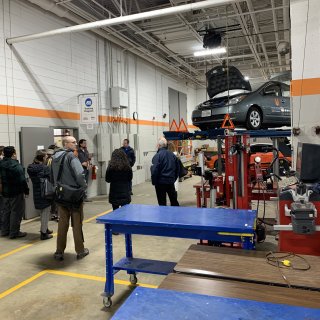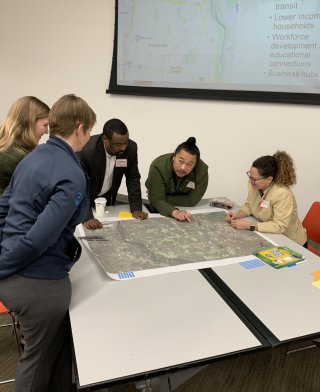Brooklyn Park, Minnesota Explores Transportation Electrification Opportunities
In 2023, EPA helped Brooklyn Park, Minnesota, explore how transportation electrification could provide more mobility options and economic opportunities for the community. Residents, businesses and government representatives came together in a collaborative workshop to share their needs and ideas for potential solutions. This experience may serve as a model for other communities seeking to engage residents, as well as private and nonprofit partners, to develop strategies to take advantage of increasing investment in electrifying transportation.
On this page:
- About Brooklyn Park
- Technical Assistance from Federal Partners
- Results from the Technical Assistance
On other pages:
About Brooklyn Park
Brooklyn Park is in Hennepin County, about 10 miles northwest of downtown Minneapolis. Home to more than 86,000 people, it is the sixth largest city in the state. About 60% of its residents are people of color, and about one-third of households speak a language other than English at home. Twenty percent of residents are recent immigrants to the United States, including 10% who have immigrated from Liberia [1].
Brooklyn Park created plans and identified resources to support EVs and EV infrastructure investments, building upon shared planning efforts and existing relationships among the city, county and state. These relationships created a strong base for collaboration and a valuable network for ongoing work.
In 2023, the Metropolitan Council and Hennepin County were advancing a Blue Line (light rail) extension with five proposed stops in Brooklyn Park. As it planned for development around the new light rail stations, the city emphasized walkable, transit-oriented development with multiple transportation modes to connect riders to the rail line.
Brooklyn Park also built on Hennepin County's participation in the Department of Energy-funded Communities Local Energy Action Program (Communities LEAP), which supports equitable community engagement to inform local decisions related to clean energy. In the Hennepin County Communities LEAP project, county and city representatives partnered with community-based organizations to engage residents to help determine priorities and inform decision-making about potential investments in EV charging infrastructure, electric buses and electric micro-mobility such as e-bikes and scooters.
In January 2024, DOE issued a report from the Communities LEAP project, Electric Mobility Opportunities for Brooklyn Park, Minnesota (PDF), which discusses in detail different types of electric transportation and how they may fit with Brooklyn Park's needs.
The Minnesota Department of Transportation's National Electric Vehicle Infrastructure deployment plan designated Interstate 94, which runs along the southern edge of Brooklyn Park, as an Alternative Fuel Corridor. The 2023 update of the deployment plan noted that, as of January 2023, Minnesota had just over 34,000 registered EVs.
Technical Assistance from Federal Partners

To help Brooklyn Park plan for federal and other investments in EV charging, EPA and a team of contractors collaborated with the U.S. Joint Office of Energy and Transportation, DOE's Vehicle Technologies Office, Minnesota Clean Cities and Communities Coalition and local staff.
The local planning team built on existing community engagement efforts, such as the Communities LEAP project, to inform the workshop activities and identify meaningful next steps. The team focused on job and workforce opportunities from EV investment, particularly for disadvantaged members.
The technical assistance site visit included community engagement activities — a tour, a community conversation and a workshop — to discuss local priorities and identify potential actions to address them. The community tour visited key sites, including:
- Brooklyn Park Small Business Center, which is located next to the proposed Blue Line extension and supports local businesses with shared office space, conferencing and retail.
- Hennepin Technical College automotive technology program to consider how current programming and job pathways may incorporate training on EV technology.
- An apartment complex to consider EV infrastructure in multifamily developments. There are many similar complexes in the community.
The community conversation brought together residents; business owners; and city, county and state representatives to discuss EVs and transportation electrification challenges. In the conversation, participants noted important local destinations and routes that need more transportation options. They discussed concerns about investing in job opportunities in these new electrification and renewable energy sectors, with an emphasis on offering engagement opportunities for youth. Participants also considered how to leverage the location of and services offered at the Brooklyn Park Small Business Center to improve access to clean transportation.
The workshop brought together people and entities working in the EV space to share information, create new relationships and develop innovative ideas. Community members and industry representatives discussed a draft list of transportation electrification goals and brainstormed strategies to achieve them. Some of the opportunities that participants considered included:
- Aligning EV charging with community needs by incorporating different charging options into EV infrastructure planning, such as level 1 chargers for e-bikes and scooters.
- Working with parallel outreach activities in the community to deliver more benefits from transportation electrification to residents and businesses.
- Engaging youth to support EV infrastructure planning and workforce development.
Results from the Technical Assistance

Using the input from the workshop, the contractor team developed a "next steps" memo to help Brooklyn Park identify specific actions to reach their goals. The memo offers an initial path forward with options the community could consider, as a living document that could be updated to align with local priorities. It does not obligate the city to pursue any specific action.
Near-Term Goals for Brooklyn Park
The list below, adapted from the next steps memo, presents Brooklyn Park's near-term goals to advance equitable transportation electrification investments, along with possible actions to achieve those goals. This list shows examples of goals and actions other communities might develop as they engage their residents and businesses to explore transportation electrification.
- Goal 1: Expand local EV-related transportation projects.
- Action 1.1: Evaluate opportunities to install Level 1 chargers at apartment complexes and employment locations.
- Action 1.2: Pursue NEVI site application funding from the Minnesota Department of Transportation.
- Action 1.3: Support expansion of Hourcar Multifamily carshare program in Brooklyn Park.
- Goal 2: Advance workforce training and business growth in EV-related industries.
- Action 2.1: Create a career pathways program and technical training, in partnership with Hennepin Technical College.
- Action 2.2: Strengthen pathways and inclusion for disadvantaged populations in workforce development opportunities.
- Goal 3: Use existing outreach networks to improve local knowledge about benefits related to EVs and EV infrastructure.
- Action 3.1: Increase general awareness of EV transportation benefits, including jobs and transportation options for residents who are Black, Indigenous and people of color.
- Action 3.2: Conduct educational field trips to learn about alternative transportation solutions.
Since the workshop, the city of Brooklyn Park and its partners have already pursued several actions identified in the next step memo:
- Presented findings from next steps memo and Communities LEAP report to the Brooklyn Park City Council for their consideration.
- Worked with Hennepin County and HourCar to apply for the Joint Office's Communities Taking Charge Accelerator Grant, in support of a potential electric car sharing pilot in the city. (Action 1.3)
- Collaborated with Hennepin County to consider potential charging station locations at county facilities that could be supported by a DOE Energy Future Grant. (Action 1.1 & 1.2)
- Collaborated with a multi-family housing property and HourCar to apply for funding from utility company to host EV charging stations at the property. (Action 1.1)
- Pursued MnDOT NEVI funding, leading to investment in Level 3 charging stations near an Interstate 94 interchange in Brooklyn Park.
- Leveraged findings from Communities LEAP Report to develop a locally-informed electric mobility education and engagement campaign serving climate vulnerable neighborhoods in Brooklyn Park and Hennepin County and supporting future outreach & engagement efforts. (Action 3.1)
This case study was published in October 2024.
[1] University of Minnesota, Resilient Communities Project. 2016-2017 Partner: Brooklyn Park. Accessed 12/12/23.
